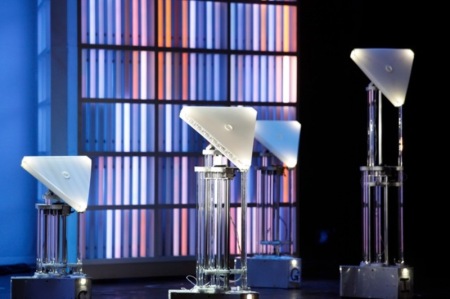This is a guest post by Irene Ros. Read more about Death and the Powers, the “robot opera,” here.
A few weeks ago, I attended one of the few Boston performances of Tod Machover’s opera, Death and the Powers. Needless to say, to me, any opera that manages to weave terms like “simulation'” “system” and “cables” into its narrative sounds like an exciting (and nerdy) experience. Enthralled by the display arrays and semi-autonomous robots, I was ready for an evening of fine music and a story that I can identify with. Sadly, I left the show far more disappointed than I thought one could be, given the subject matter.
In the opera, the main character, Simon, is a successful businessman who basks in the glory of the capitalism that made him who he is. But he’s also terminally ill, and he decides to use his hoards of money to migrate his being into the System, an infallible “place.” (Any resemblance of the System to the Singularity is, well, probably not coincidental.) As as I chuckled at Simon singing about his ‘big bucks,’ I started to feel some pangs of missed opportunity clawing at mind. Why pick (another) rich white guy as the protagonist?
Shortly after Simon’s transition to the System, we watched the two female characters in the opera compete for who could appear weaker. His wife Evvy literally loses her voice after Simon’s departure; her subsequent appearances on stage show her as practically unhinged, wandering around the stage wearing headphones to hear the voice of her sublimed husband: after his disappearance, she apparently has no reason to remain a human being with a personality of her own. While Nicholas, Simon’s son, immediately follows him into the System, his daughter Miranda is the only character in the opera who expresses unease. But Miranda’s anxiety is largely presented as how much she misses her father. Her reasoning is so well hidden behind a wall of fragile loneliness that the viewer can’t possibly focus on the legitimate questions she was (almost) asking.
In leaving reality for the System, and taking his wealth with him, Simon somehow crashed the world’s economy (sound familiar?). He resists the entreaties of earthbound organizations to do something to repair it, and the needs of the sick, poor and children then receive their 15 minutes of fame: I was left speechless as a band of what appeared to be zombies walked on stage and attacked Miranda. Why would the needy look like zombies? And were they planning on dancing to “Thriller? Portraying capitalism in such a glorified way, as the destroyer and savior all at once, is nothing short of shameful in my mind. I couldn’t imagine how the opera could get any farther from actually shedding light on our society.
There were so many opportunities missed in this opera to discuss not just the technology question, but also to comment on our social structure through the eyes of the future. While I am certain some would argue that it’s just an opera, and not necessarily the place and time to discuss the impact of capitalism, it would be hard to argue that the storyline didn’t glorify it, at the cost of devaluing anyone who isn’t rich (or male, or white).
Machover heads the Opera of the Future group at MIT’s Media Lab, and it’s past time for us technologists to stop separating our technology from its social context and its impact on society. Perhaps the opera is most successful at showing how technology, thoughtlessly applied, will only recapitulate the existing social and power structures. Where the digital and human merge, the ethical questions and possibilities for change extend far beyond the limited ones presented in Death and the Powers.
Irene Ros is an artist, musician and visualization research developer at the Visual Communication Lab of IBM Research, in Cambridge, MA. Learn more about her and her work at ireneros.com.





